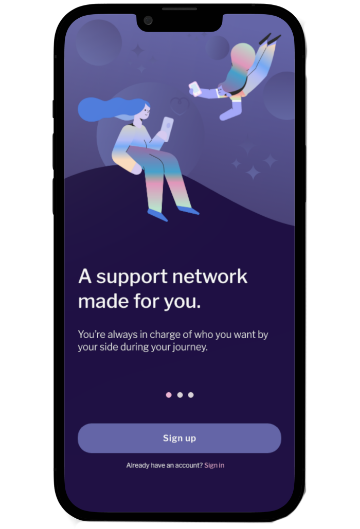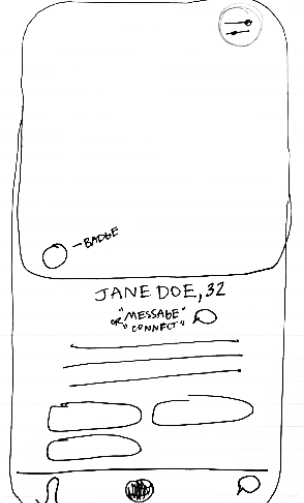
Haven
MY ROLE
UX/UI Design
User Research
Market Research
TOOLS
Adobe XD
Qualtrics XM
Type
Interactive Mobile Prototype
DATE COMPLETED
April 2022
The Backstory
In the aftermath of having a rare breast tumor I began to reflect deeply on my experience. What stood out was the overwhelming loneliness I experienced, even when surrounded by family and friends. After reaching out to other women like me on social media, I learned that my experience was not unique. I began to think about how I could rewrite our shared narrative and ensure facing a breast condition or cancer was a journey not traveled alone.
The Problem
People with breast cancer with a limited social network or inadequate social support from their network are at increased risk of psychosocial distress, anxiety and depression and cancer progression.(1)
1.) Drageset, S., Lindstrøm, T. C., Giske, T., & Underlid, K. (2012). “The Support I Need”: Women’s Experiences of Social Support After Having Received Breast Cancer Diagnosis and Awaiting Surgery. Cancer Nursing, 35(6), E39–E47.
The Challenge
Since this project is a passion project and I am also a part of the community I am designing for, I relied heavily on secondary research and primary research to separate my own biases from the project and inform my design decisions.
How might I put a resource in the hands of people with breast conditions and cancers that helps them feel less alone on their journey?
Secondary Research
SUPPORT
Social support is important for those dealing with a breast condition or cancer, however the support provided has to be adjusted to each person’s needs. (1)
CONFIDANTS
Some of the women preferred to confide in someone outside their family, people who were not too emotionally involved: ‘‘It’s easier to open up to someone more distant.’’ (1)
BALANCE
A balance needs to be struck between being close to one’s social network and securing a certain distance from it in order to receive enough but not too much social support and care. Some gave priority to their family members’ need for social support instead of being supported themselves. (1)
LONLINESS
Supportive interaction with peers having common experiences may decrease feelings of isolation and may increase a sense of belonging. (2)
WELL-BEING
Changes in social support were related to higher negative affect, illustrating some evidence that changes in social support may also be related to changes in emotional well-being.(3)
QUALITY
Social support quality may be a stronger predictor of emotional health than social support quantity.(3)
1.) Drageset, S., Lindstrøm, T. C., Giske, T., & Underlid, K. (2012). “The Support I Need”: Women’s Experiences of Social Support After Having Received Breast Cancer Diagnosis and Awaiting Surgery. Cancer Nursing, 35(6), E39–E47.
2.) Moon, T.-J., Chih, M.-Y., Shah, D. V., Yoo, W., & Gustafson, D. H. (2017). Breast Cancer Survivors’ Contribution to Psychosocial Adjustment of Newly Diagnosed Breast Cancer Patients in a Computer-Mediated Social Support Group. Journalism & Mass Communication Quarterly, 94(2), 486–514.
3.) Fong, A. J., Scarapicchia, T. M. ., McDonough, M. H., Wrosch, C., & Sabiston, C. M. (2017). Changes in social support predict emotional well being in breast cancer survivors. Psycho-Oncology (Chichester, England), 26(5), 664–671
Market Research
After independently surveying publicly available apps for breast cancer, I determined:
1.) 50% of breast cancer apps focus on symptom management, planning and organizing care, as well as imparting information about cancer.
2.) NONE of the breast cancer apps offer one-to-one matching as a mechanism for connecting users.
Interviews
Users were asked to describe their experiences of social support after their diagnosis. Here’s what they had to say.
“We need a support person. We need someone to be able to call with all our fears. I don’t want to bring it to my mom and have her worry about it. We need to be told it’s normal.”
“I don’t feel like I really belong to any of the groups. Do I join the breast cancer group or the sarcoma group? Do I belong in the one for life after cancer or for living with cancer?”
“I find that my therapist cannot really help me with cancer related issues”
“Talking to friends and family are a helpful resource but not the same as someone who is going through it and understands”
“It’s overwhelming and brings up fear. (on private facebook groups) I want to tell the world when I can ring the bell. That was the best ever. I feel scared to (post) because someone else may not be able to do that.”
“Celebrating the good news and giving comfort when the news is bad or the journey must repeat is important.”
Primary Research
I asked people affected by a breast condition or cancer if they had been offered emotional and mental health support resources like support groups after their diagnosis.
Are users interested in a peer-to-peer support app?
Top three features users want in a peer-to-peer support app.
User Flow
User Personas
Although this app’s primary audience is the breast cancer community, this community has diverse needs and pain points depending on a variety of factors such as age, diagnosis and life stage (recently diagnosed, in treatment, survivor). I created three personas based on my research that capture the core needs and issues faced by each of those users.



Empathy Mapping
UI Design
COLORS
TYPOGRAPHY






Focusing on What Matters
About Haven
Haven exists so no one ever faces a breast condition or cancer alone. Recognizing the feelings of isolation that come with a diagnosis, Haven helps people feel seen and supported on their journey through peer to peer support.
One-to-one matching and interaction connects members through commonalities such as age, diagnosis and treatments received. Members can get to know their matches better through messaging and video chat, even making connections with people local to their area. Rather than subjecting its users to overwhelming content and unsought interactions, Haven gives users full control of their own support network.
Whether you’re recently diagnosed or a survivor, making connections with others on the same journey as you has never been easier. A friend who knows exactly what you are going through is within the reach of your fingertips.






















